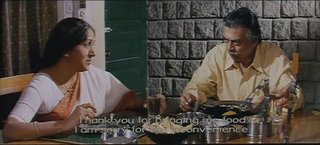 Preeti Prema Pranaya (2003)
Preeti Prema Pranaya (2003)Featuring: Anant Nag, Bhaarati, Prakash Rai, Sudharani, Sunil Raoh, Anu Prabhakar, Bhavana and others.
Directed by: Kavita Lankesh
“At twenty we worry about what others think of us; at forty we don't care about what others think of us; at sixty we discover they haven't been thinking about us at all.” is an old-age quote I had read somewhere. At that point although it seemed like a smart thing to say, I never realized how much that would re-appear as I watched “Preeti Prema Pranaya” (PPP).
Hoisted under the flagship of Kavita Lankesh, PPP unfolds a story as old as cinema itself. One would be rather naïve to presume this is one of those “old people falling in love” stories since that assumption would do no justice to the rainbow of emotions Kavita manages to capture on film.
Dr.Chandrashekhar (Anant) and Sharada Devi (Bhaarati) play a couple of aging individuals who have lost their respective spouses. While the doctor is busy being told what is good for him by his two rather obsessive and “control-crazy” sons Prakash Rai and Arun Sagar (both doctors as well), Sharada Devi is occupied with a lonely house and classical music for company.
A chance encounter in a park (watch out for Upendra, o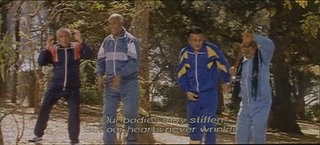 r at least someone who could be his twin, appear in a “blink and miss” role!) brings these two together. The doctor’s kindness and helping nature only acts as a catalyst in creating a strong foundation for this new friendship. The doctor finds a solution to his lonesomeness in the form of Sharada who is equally lonely and reciprocates the doctor’s friendly nature. While the doctor’s sons and daughter-in-laws (Sudharani and Bhavana – both in a rather wasted role) wonder what has been keeping the old man pretty busy lately, Sharada’s grand-daughter (Anu Prabhakar) arrives from the United States to visit her granny.
r at least someone who could be his twin, appear in a “blink and miss” role!) brings these two together. The doctor’s kindness and helping nature only acts as a catalyst in creating a strong foundation for this new friendship. The doctor finds a solution to his lonesomeness in the form of Sharada who is equally lonely and reciprocates the doctor’s friendly nature. While the doctor’s sons and daughter-in-laws (Sudharani and Bhavana – both in a rather wasted role) wonder what has been keeping the old man pretty busy lately, Sharada’s grand-daughter (Anu Prabhakar) arrives from the United States to visit her granny.
Sunil Raoh (Prakash Rai’s and Sudharani’s son) discovers his newfound love in Anu and soon they are singing duets in a foreign city with cars whizzing by. This brings us to two parallel stories of affection between two extremely different generations. While on the one hand the old couple is always relying on the new ones to find ways to meet, the so called “middle generation” is seeing everything with eyes of suspicion.
There comes a point when the doctor and Sharada both realize that their aging days look bleak as the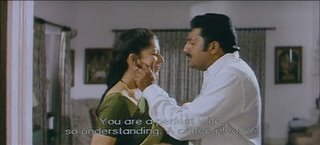 y watch their peers end up in old-age homes or His blessed feet courtesy their respective off springs. This wondering makes them take a stance that they are not going to let their kids run what is left of their lives. They cannot imagine having to while away their glorious days waiting for an overseas call or taking instructions from their foolhardy sons. This comes as a shock to everyone else and there is a lot of resistance to this decision. But nothing is going to stop these two from getting the companionship that promises to fill the void they live with.
y watch their peers end up in old-age homes or His blessed feet courtesy their respective off springs. This wondering makes them take a stance that they are not going to let their kids run what is left of their lives. They cannot imagine having to while away their glorious days waiting for an overseas call or taking instructions from their foolhardy sons. This comes as a shock to everyone else and there is a lot of resistance to this decision. But nothing is going to stop these two from getting the companionship that promises to fill the void they live with.
PPP refreshes an important theme for our times. Living in a generation where we no longer care for anyone else but ourselves, movies like PPP are a gentle reminder of what our parents go through today and what we will have to face in the days to come. While it may look scary, PPP reassures us that all it takes is a little understanding and a companion to complete this long journey called life with a smile on our hearts.
The show belongs to the veterans Anant and Bharati throughout. They manage their unique roles with aplomb without going overboard with their emotional quotients. It was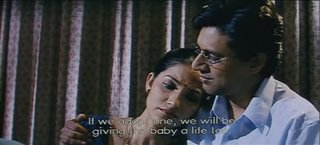 really refreshing to watch Bharati in a very realistic role that many women can identify with in today’s India. I hope she continues to essay such defining roles in the future as well. Anant is as always a treat to watch. The more I watch him in such varied performances the more I am convinced of his genius. He executes the role of a tired old man looking for someone to hold on to with a lot of conviction.
really refreshing to watch Bharati in a very realistic role that many women can identify with in today’s India. I hope she continues to essay such defining roles in the future as well. Anant is as always a treat to watch. The more I watch him in such varied performances the more I am convinced of his genius. He executes the role of a tired old man looking for someone to hold on to with a lot of conviction.
As I have said earlier, it is very hard to get noticed in such a high-profile star ensemble. This is probably why Sudharani and Bhavana seem wasted in their stereotypical “we want to be known as good daughter-in-laws” role. I wonder if Kavita could have done a little more with their characters. Their respective husbands Prakash Rai and Arun do their jobs tidily as well with nothing out of the ordinary. It was nice to see Prakash in a Kannada feature after a very long time.
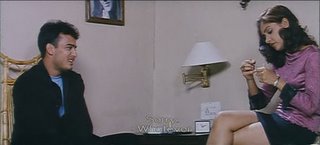 The younger cast of Sunil and Anu also do a confident job despite being cast opposite legends like Anant and Bharati. Their romance adds as a perfect fuel to gel the two main protagonists and that has been showcased well.
The younger cast of Sunil and Anu also do a confident job despite being cast opposite legends like Anant and Bharati. Their romance adds as a perfect fuel to gel the two main protagonists and that has been showcased well.
Editing is the one area that Kavita needs to get some lessons in. Post intermission portions are well handled but the first half seems very rushed. I wonder if it had any production-components involved. Kavita’s “song inclusion timing” is also definitely cliché. Songs appear out of nowhere and have absolutely no role in the story’s progress. It was almost like the cast said “We need a song!” and hence the presentation. It would have made more sense had the songs been arranged and presented in a logical way (although I admit it is hard to do in Indian movies all the time.) Other technical features are fair and add the needed gloss to the over all PPP package.
A good script with a noble theme and fine performances. PPP is worth a watch.
![]()
Hoisted under the flagship of Kavita Lankesh, PPP unfolds a story as old as cinema itself. One would be rather naïve to presume this is one of those “old people falling in love” stories since that assumption would do no justice to the rainbow of emotions Kavita manages to capture on film.
Dr.Chandrashekhar (Anant) and Sharada Devi (Bhaarati) play a couple of aging individuals who have lost their respective spouses. While the doctor is busy being told what is good for him by his two rather obsessive and “control-crazy” sons Prakash Rai and Arun Sagar (both doctors as well), Sharada Devi is occupied with a lonely house and classical music for company.
A chance encounter in a park (watch out for Upendra, o
 r at least someone who could be his twin, appear in a “blink and miss” role!) brings these two together. The doctor’s kindness and helping nature only acts as a catalyst in creating a strong foundation for this new friendship. The doctor finds a solution to his lonesomeness in the form of Sharada who is equally lonely and reciprocates the doctor’s friendly nature. While the doctor’s sons and daughter-in-laws (Sudharani and Bhavana – both in a rather wasted role) wonder what has been keeping the old man pretty busy lately, Sharada’s grand-daughter (Anu Prabhakar) arrives from the United States to visit her granny.
r at least someone who could be his twin, appear in a “blink and miss” role!) brings these two together. The doctor’s kindness and helping nature only acts as a catalyst in creating a strong foundation for this new friendship. The doctor finds a solution to his lonesomeness in the form of Sharada who is equally lonely and reciprocates the doctor’s friendly nature. While the doctor’s sons and daughter-in-laws (Sudharani and Bhavana – both in a rather wasted role) wonder what has been keeping the old man pretty busy lately, Sharada’s grand-daughter (Anu Prabhakar) arrives from the United States to visit her granny.Sunil Raoh (Prakash Rai’s and Sudharani’s son) discovers his newfound love in Anu and soon they are singing duets in a foreign city with cars whizzing by. This brings us to two parallel stories of affection between two extremely different generations. While on the one hand the old couple is always relying on the new ones to find ways to meet, the so called “middle generation” is seeing everything with eyes of suspicion.
There comes a point when the doctor and Sharada both realize that their aging days look bleak as the
 y watch their peers end up in old-age homes or His blessed feet courtesy their respective off springs. This wondering makes them take a stance that they are not going to let their kids run what is left of their lives. They cannot imagine having to while away their glorious days waiting for an overseas call or taking instructions from their foolhardy sons. This comes as a shock to everyone else and there is a lot of resistance to this decision. But nothing is going to stop these two from getting the companionship that promises to fill the void they live with.
y watch their peers end up in old-age homes or His blessed feet courtesy their respective off springs. This wondering makes them take a stance that they are not going to let their kids run what is left of their lives. They cannot imagine having to while away their glorious days waiting for an overseas call or taking instructions from their foolhardy sons. This comes as a shock to everyone else and there is a lot of resistance to this decision. But nothing is going to stop these two from getting the companionship that promises to fill the void they live with.PPP refreshes an important theme for our times. Living in a generation where we no longer care for anyone else but ourselves, movies like PPP are a gentle reminder of what our parents go through today and what we will have to face in the days to come. While it may look scary, PPP reassures us that all it takes is a little understanding and a companion to complete this long journey called life with a smile on our hearts.
The show belongs to the veterans Anant and Bharati throughout. They manage their unique roles with aplomb without going overboard with their emotional quotients. It was
 really refreshing to watch Bharati in a very realistic role that many women can identify with in today’s India. I hope she continues to essay such defining roles in the future as well. Anant is as always a treat to watch. The more I watch him in such varied performances the more I am convinced of his genius. He executes the role of a tired old man looking for someone to hold on to with a lot of conviction.
really refreshing to watch Bharati in a very realistic role that many women can identify with in today’s India. I hope she continues to essay such defining roles in the future as well. Anant is as always a treat to watch. The more I watch him in such varied performances the more I am convinced of his genius. He executes the role of a tired old man looking for someone to hold on to with a lot of conviction.As I have said earlier, it is very hard to get noticed in such a high-profile star ensemble. This is probably why Sudharani and Bhavana seem wasted in their stereotypical “we want to be known as good daughter-in-laws” role. I wonder if Kavita could have done a little more with their characters. Their respective husbands Prakash Rai and Arun do their jobs tidily as well with nothing out of the ordinary. It was nice to see Prakash in a Kannada feature after a very long time.
 The younger cast of Sunil and Anu also do a confident job despite being cast opposite legends like Anant and Bharati. Their romance adds as a perfect fuel to gel the two main protagonists and that has been showcased well.
The younger cast of Sunil and Anu also do a confident job despite being cast opposite legends like Anant and Bharati. Their romance adds as a perfect fuel to gel the two main protagonists and that has been showcased well.Editing is the one area that Kavita needs to get some lessons in. Post intermission portions are well handled but the first half seems very rushed. I wonder if it had any production-components involved. Kavita’s “song inclusion timing” is also definitely cliché. Songs appear out of nowhere and have absolutely no role in the story’s progress. It was almost like the cast said “We need a song!” and hence the presentation. It would have made more sense had the songs been arranged and presented in a logical way (although I admit it is hard to do in Indian movies all the time.) Other technical features are fair and add the needed gloss to the over all PPP package.
A good script with a noble theme and fine performances. PPP is worth a watch.
No comments:
Post a Comment